|
|
|
Sort Order |
|
|
|
Items / Page
|
|
|
|
|
|
|
| Srl | Item |
| 1 |
ID:
120541
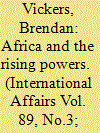

|
|
|
|
|
| Publication |
2013.
|
| Summary/Abstract |
With abundant resources and growing markets, the African continent is once again at the centre of a new 'great game of courtship' between the established and rising powers. However, compared with previous decades, African countries are no longer passive players in international relations.
This article explores Africa's recent negotiating behaviour in relation to a selected set of actors that animate the current shifting global economic order: rising powers, established powers and international organizations. Despite potential sources of bargaining leverage, most African countries (with some notable exceptions) are still reactive to the bilateral overtures of Brazil, China and India and unable to set the terms of engagement.
Nonetheless, the rise of these new powers provides alternative negotiating partners (and potentially more developmental outcomes) to the established powers. By comparison, at the multilateral level the African Group has been far more active and assertive in contesting global governance in the pursuit of greater distributive justice, particularly in the climate, trade and security regimes. This has taken place largely through the adroit use of distributive bargaining and tactics, supplemented by normative-based strategies highlighting Africa's underdevelopment.
The central argument of the article is that African countries require judicious negotiating strategies, improved deliberative capacities and coalitions with local/continental/global civil society and business networks in order to ameliorate their weaker bargaining power and reshape the terms of their engagement with their international partners, particularly the rising powers.
|
|
|
|
|
|
|
|
|
|
|
|
|
|
|
|
| 2 |
ID:
153144
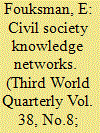

|
|
|
|
|
| Summary/Abstract |
What role have the processes and institutions of international development played in creating and propagating ideas around the world? This paper demonstrates that networks of development-focused civil society institutions can form global epistemic bridges even where communication technology, global markets, infrastructure, or state services do not reach. Given the penetration of these ‘civil society knowledge networks’ throughout the world, it is crucial to understand how these networks form, and how they create and spread ideas, mediating between global discourses and local needs. This paper builds on a multi-sited case study of one such civil society knowledge network, which includes an international foundation, its partner non-governmental organisations (NGOs) in Kenya, and one village where these NGOs run a forest conservation project. The case study provides a closely textured analysis of the mechanisms of knowledge production and consumption in the network, including personality politics, language, technology, political connections and the power dynamics of knowledge flows. It demonstrates the ways remoteness and disconnection are overcome through the epistemic reach of institutional networks involved in development interventions.
|
|
|
|
|
|
|
|
|
|
|
|
|
|
|
|
| 3 |
ID:
095615
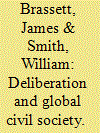

|
|
|
|
|
| Publication |
2010.
|
| Summary/Abstract |
The article provides a critical analysis of the role and function of global civil society within deliberative approaches to global governance. It critiques a common view that global civil society can/should act as an agent for democratising global governance and seeks to explore the importance of global civil society as an arena of deliberation. This more reconstructive aim is supplemented by an empirically focused discussion of the affective dimensions of global civil society, in general, and the increasingly important use of film, in particular. Ultimately, this then yields an image of the deliberative politics of global civil society that is more reflective of the differences, ambiguities and contests that pervade its discourses about global governance. This is presented as a quality that debates about deliberative global governance might learn from as well as speak to.
|
|
|
|
|
|
|
|
|
|
|
|
|
|
|
|
| 4 |
ID:
114231
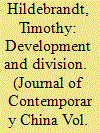

|
|
|
|
|
| Publication |
2012.
|
| Summary/Abstract |
Identity movements, such as those representing LGBT communities, are assumed to be highly universalized; they are often thought to be highly dependent upon international linkages in order to emerge and develop. Although the Chinese LGBT movement owes much of its development to global civil society and international donors, this article presents survey and interview data that show its linkages with the international community are not as strong as we might expect. The article shows that economics and politics of transnational activism in China are tightly intertwined. The means by which LGBT activism has developed in China has simultaneously contributed to division within its ranks and with global civil society: the nature of international funding-while from foreign sources it is funneled through the Chinese government-and local political conditions ultimately impedes the growth of stronger transnational linkages.
|
|
|
|
|
|
|
|
|
|
|
|
|
|
|
|
| 5 |
ID:
151507
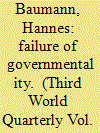

|
|
|
|
|
| Summary/Abstract |
This article critiques the Foucauldian approach to governance indicators. Transparency International’s (TI) Corruption Perceptions Index (CPI) underestimated Tunisian corruption levels under President Ben Ali: his regime was highly corrupt but foreign investors were less affected. CPI methodology meant it reflected primarily the needs of foreign investors. The Foucauldian approach specifically excludes analysis of governance indicators’ methodologies. It thus fails to demonstrate the effectiveness of governance indicators as a technology of government, and it fails to show how the production of the CPI is embedded in a wider global political economy.
|
|
|
|
|
|
|
|
|
|
|
|
|
|
|
|
| 6 |
ID:
087342
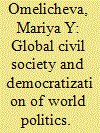

|
|
|
|
|
| Publication |
2009.
|
| Summary/Abstract |
For over a decade, scholars have been studying and debating the role and influence of non-state actors in democratizing global politics. The sheer volume of studies calls for assessing the current state of this area of research. It also invites systematic analysis of differences in the collected evidence on outcomes of the democratizing efforts of global civil society associations. In this review, I (1) expound the concept of global civil society and point to definitional dilemmas surrounding this term; (2) propose a new analytical framework for examining an association between global civil society and democratization; (3) apply the proposed framework for assessing the findings of empirical studies; (4) discuss the nature of differences and the sources of discord in the analysts' conclusions; and (5) make recommendations for advancing our knowledge in this important area of research. A principal theme that runs throughout this essay is that the field of global civil society and democratization has ample avenues for further conceptual, theoretical, and empirical work. Our ability to speak credibly of global civil society as a viable democratizing force would be improved with the development of empirical theory, conceptual elaboration, and more rigorous methodologies of research.
|
|
|
|
|
|
|
|
|
|
|
|
|
|
|
|
| 7 |
ID:
121201
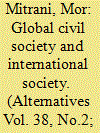

|
|
|
|
|
| Publication |
2013.
|
| Summary/Abstract |
The use of the concept of "global civil society" (GCS) acknowledges the intensifying role of non-state civic actors in world politics and expresses the emergence of a unique social sphere transcending national boundaries. Extensive literatures strive to suggest conceptualizations and assessments of the actual and desired effects of GCS. Nevertheless, relatively little attention has been given to the interplay between the emerging sphere of a GCS and the traditional sphere of international or interstate interactions. This article examines the idea of GCS through an exploration of the conceptual interplay between the notions of GCS and the interstate system. It presents a typology of three possible ideal-type relations: (1) GCS as replacement of statist features of the international system; (2) GCS as opposition to the state system; and (3) GCS as subsidiary organ to the international society. From a perspective informed by the English School of international relations theory, the article argues that the enhanced role of GCS in world politics is a result of international society's attempts to adapt interstate rules and practices to the context of globalization.
|
|
|
|
|
|
|
|
|
|
|
|
|
|
|
|
| 8 |
ID:
088080
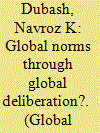

|
|
|
|
|
| Publication |
2009.
|
| Summary/Abstract |
In recent years, global "deliberative processes" bringing together government, civil society, and private sector actors have become increasingly common on the global stage. Past work on these processes has either read them as relatively unproblematic consensus-building exercises, or exercises in global corporatism. Using a case study of the World Commission on Dams, this article explores how formal global deliberative processes can be a strategy for global norm formation and legitimation. It suggests that global deliberation can indeed be a vehicle for emergence and propagation of norms, but that these processes face multiple challenges that are structural in nature. Three factors are identified as key elements in understanding norm emergence through global deliberation: the legitimacy of global deliberation linked to questions of representation and democratic procedure; the micropolitics of norm emergence; and the process through which incipient norms are institutionalized by states.
|
|
|
|
|
|
|
|
|
|
|
|
|
|
|
|
| 9 |
ID:
126133
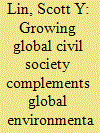

|
|
|
|
|
| Publication |
2013.
|
| Summary/Abstract |
Although the increasing influence of global civil society has been noted in environmental politics and this phenomenon is synonymous with global environmental governance, some questions remain: where does this change in mentality originate and through what forces, how are these forces motivated, and how do they continue to motivate the "environmental agenda"? A primary factor is the establishment of transnational institutions that stimulates the participation of global civil society in global environmental governance and how this participation has diminished government authority by reinforcing local loyalties with their viewpoints concerning the environment. Thus, the debate becomes how the interpretation of global environmental governance and "top-down" approaches affects and is affected by local practices in civil society. This study examines the growing importance of global civil society to the Lancang/Mekong fish catch- the world's largest inland fishery-and the dam project disputes concerning the Lancang/Mekong River. The following analysis concerns the influence of the rising global civil society on the effectiveness of these environmental governance entities. The analysis indicates that participation of the global civil society in the Lancang/Mekong dam decision-making process concerning the fisheries does not replace the traditional mechanism of governmental governance. Instead, the growing influence of the global civil society is compatible with operations of the governmental governance mechanism, complementing the function of global environmental governance.
|
|
|
|
|
|
|
|
|
|
|
|
|
|
|
|
| 10 |
ID:
118877
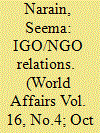

|
|
|
| 11 |
ID:
111902
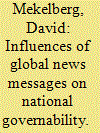

|
|
|
|
|
| Publication |
2012.
|
| Summary/Abstract |
The environment has been forced to the margins of Israeli political discourse in the past and has received little attention from formal institutes. Nevertheless, since the mid-1980s, environmental consciousness and public discourse have increased, mainly encouraged by Israeli civil society. This paper argues that since Israeli governmental and educational systems do not deal with environmental issues, the development of environmentalism in Israeli society is the outcome of a three-step process: first, an increase in the homogenization of cross-border messages; in turn this contributes to the homogenization of principles, norms, rules and decision-making procedures; and finally, plays a role in creating a greater sense of belonging to the global community. The paper probes the development of global environmental messages' influence on Israeli society and politics between the two first main UN environmental conferences of 1972 and 1992 by presenting a qualitative and quantitative analysis of The New York Times (USA), The Times (UK) and Ma'ariv and Yediot Ahronot (Israel) during the time of these conferences. A comprehensive survey is presented, along with interviews with representatives from 78 environmental NGOs in Israel that were established by 1995.
|
|
|
|
|
|
|
|
|
|
|
|
|
|
|
|
| 12 |
ID:
112827
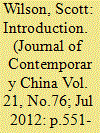

|
|
|
|
|
| Publication |
2012.
|
| Summary/Abstract |
Since 1978, China has opened itself, not just to the global economy, but also to social movements and non-governmental organizations (NGOs) in global civil society. Scholarship on Chinese NGOs and civil society has reflected these developments, contrasting the state's early attempts to eradicate and control civil society organizations with more recent acceptance of, and even reliance on, the NGO sector. Two factors-linkages between Chinese NGOs and international actors and online communications-have propelled Chinese civil society development. Yet, Chinese civil society remains uneven across geographic and issue areas. This introduction examines the opportunity structures presented to Chinese NGOs by international and online linkages, as well as introduces the articles collected in this special section (in two parts).
|
|
|
|
|
|
|
|
|
|
|
|
|
|
|
|
| 13 |
ID:
065096
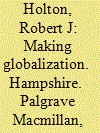

|
|
|
|
|
| Publication |
Hampshire, Palgrave Macmillan, 2005.
|
| Description |
ix, 213p.
|
| Standard Number |
1403948682
|
|
|
|
|
|
|
|
|
|
|
|
Copies: C:1/I:0,R:0,Q:0
Circulation
| Accession# | Call# | Current Location | Status | Policy | Location |
| 050016 | 303.482/HOL 050016 | Main | On Shelf | General | |
|
|
|
|
| 14 |
ID:
113731
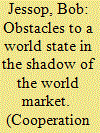

|
|
|
|
|
| Publication |
2012.
|
| Summary/Abstract |
This article explores the obstacles to the development and operation of a world state that are rooted in functional differentiation of modern societies, the ecological dominance of the broadly capitalist world market, and the inherent tendencies of all forms of governance to fail. It also highlights the challenges to the temporal as well as territorial sovereignty of states, whatever their scale of operation, due to the acceleration as well as globalization of social relations. Combining insights from Niklas Luhmann and Karl Marx, the article develops some novel arguments about multi-spatial metagovernance as an alternative approach to the problems posed by a world state as the guarantor of global social order.
|
|
|
|
|
|
|
|
|
|
|
|
|
|
|
|
| 15 |
ID:
091916
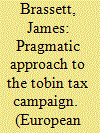

|
|
|
|
|
| Publication |
2009.
|
| Summary/Abstract |
The article provides a critical analysis of the campaign for a Tobin Tax. A popular view that global civil society can act as an agent for ethics is interrogated by appeal to the dilemmas and political contests which pervade the campaign. Problems with financial and institutional universalism undermine any unambiguous ethical appeal in the Tobin Tax by imposing a set of limits on thinkable avenues of reform. However, and drawing on the philosophical pragmatism of Richard Rorty, it is argued that the campaign can be celebrated for its role in ongoing practices of 'sentimental education'. By illustrating the harm that financial markets cause, the Tobin Tax involves larger, more diverse, audiences in a conversation about global finance; technical and sentimental discourses blur. Moreover, those very contests that pervade the campaign can act to interrupt the totalizing aspects of the proposal, thus making alternatives thinkable. Engaging the 'politics of sentimental education', in this way, allows a contingent celebration of what is ethically useful in the Tobin Tax, while leaving an area of contest that is potentially antithetical. Rather than plump for an either/ or position, the difficult, but ethical, challenge is to do both-and. The article concludes by suggesting how this 'politics of sentimental education' might bear upon existing knowledge about the theory and practice of global civil society.
|
|
|
|
|
|
|
|
|
|
|
|
|
|
|
|
| 16 |
ID:
144054
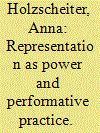

|
|
|
|
|
| Summary/Abstract |
This article analyses global civil society advocacy in the field of child labour through the lens of theories on political representation in global governance. The article is sympathetic to newer theories on political representation which, fundamentally, understand representation as a dialectic of performative practices between representatives and their real or imagined constituencies. However, the article argues that the contemporary literature on political representation turns a blind eye on two aspects that are central to understanding this dialectic of representation in the child labour case: first, representation as power and second, the contested nature of citizenship. The article thus proposes an approach to political representation that allows highlighting the power-dimension inherent to the interrelation between formal and performative aspects of representation, that is, between civil society actors’ power to represent and their power over representation. Using such an approach, the article presents empirical insights on CSO representation in global policymaking on child labour – a field in which conflicts over legitimate representation, citizenship, and grassroots participation continue to be exceptionally fierce.
|
|
|
|
|
|
|
|
|
|
|
|
|
|
|
|
| 17 |
ID:
181852
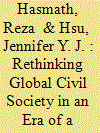

|
|
|
|
|
| Summary/Abstract |
The concept of global civil society arose out of a language, culture and definition influenced by mainstream Western political philosophy and discourse, and the behavior of Western NGOs that proliferated in the latter part of the 20th century. The recent rise of Chinese social organizations internationally—which were born, developed, and prospered in a domestic authoritarian institutional environment with varying values and norms than their Western counterparts—suggests a rethink of how global civil society is conceived. Namely, as Chinese social organizations internationalize, they ultimately export to host nations their best/worst practices, modes of operation, organizational behavior, and values and norms. This article looks at the experiences of Chinese social organizations domestically and abroad, and discerns how their actions and behavior potentially confirm, modify, and/or reject the contemporary conceptual understanding of global civil society.
|
|
|
|
|
|
|
|
|
|
|
|
|
|
|
|
| 18 |
ID:
020210
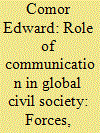

|
|
|
|
|
| Publication |
Sept 2001.
|
| Description |
389-408
|
|
|
|
|
|
|
|
|
|
|
|
|
|
|
|
| 19 |
ID:
116225
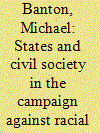

|
|
|
|
|
| Publication |
2012.
|
| Summary/Abstract |
Since 1970, states that are parties to the International Convention on the Elimination of Racial Discrimination have been reporting on the implementation of their treaty obligations. In the first two decades, states assumed the right to define the issues. Because of changes in the practice of the treaty-monitoring body, nongovernmental organizations in the more democratic states have been increasingly able to contribute alternative perspectives. This has been a significant step in the development of global civil society.
|
|
|
|
|
|
|
|
|
|
|
|
|
|
|
|
| 20 |
ID:
120951
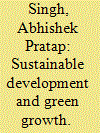

|
|
|
|
|
|
|
|